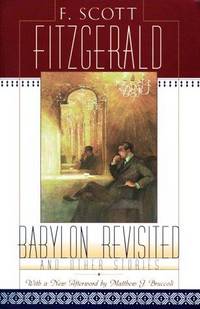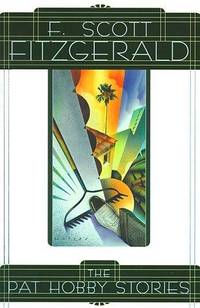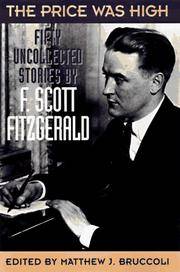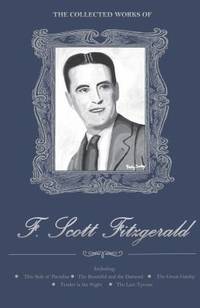Fitzgerald is regarded as one of the greatest American writers of the twentieth century. In his own age, Fitzgerald was the self-styled spokesman of the "Lost Generation", or the Americans born in the 1890s who came of age during World War I. He finished four novels, left a fifth unfinished, and wrote dozens of short stories that treat themes of youth, despair, and age. Many admire what they consider his remarkable emotional honesty. His heroes- handsome, confident, and doomed - blaze brilliantly before exploding, and his heroines are typically beautiful, intricate, and alluring.
Born in Saint Paul, Minnesota to an upper-middle class Roman Catholic family, Fitzgerald was named for his distant and famous relative Francis Scott Key, but was commonly known as 'Scott'.
Fitzgerald spent 1898-1901, and 1903- 1908 in Buffalo, New York, where his father worked for Procter & Gamble. When Fitzgerald, Sr., was fired, the family moved back to Minnesota, where Fitzgerald attended Saint Paul Academy and Summit School in Saint Paul, Minnesota from 1908 - 1911. He then attended Newman School, a prep school in Hackensack, New Jersey, in 1911- 1912. He entered Princeton University in 1913 as a member of the Class of 1917 and became friends with the future critics and writers Edmund Wilson (Class of 1916) and John Peale Bishop (Class of 1917). Saddled with academic difficulties throughout his three-year career at the university, Fitzgerald dropped out in 1917 to enlist in the United States Army when America entered World War I.
Fearing he might die in the war, and determined to leave a literary legacy, Fitzgerald wrote a novel entitled
The Romantic Egotist while in officer training at Camp Zachary Taylor and Camp Sheridan. When Fitzgerald submitted the novel to the publisher Charles Scribner's Sons, the editor praised Fitzgerald but ultimately declined to publish.
The war ended shortly after Fitzgerald's enlistment, and he was discharged without ever having been shipped to Europe.
Life with Zelda
While at Camp Sheridan, Fitzgerald met Zelda Sayre (1900- 1948), the "top girl," in Fitzgerald's words, of Montgomery, Alabama, youth society. The two were engaged in 1919 and Fitzgerald moved into an apartment at 200 Claremont Avenue in New York City to try to lay a foundation for his life with Zelda. Working at an advertising firm and writing short stories, Fitzgerald was unable to convince Zelda that he would be able to support her. She broke off the engagement and Fitzgerald returned to his parents' house in St. Paul to revise The Romantic Egotist. Recast as
This Side Of Paradise, it was accepted by Scribner's in the fall of 1919, and Zelda and Scott resumed their engagement. The novel was published on March 26, 1920, and became one of the most popular books of the year, defining the flapper generation. The next week, Scott and Zelda were married in New York's St. Patrick's Cathedral. Their daughter and only child, Frances Scott "Scottie" Fitzgerald, was born on October 26, 1921.
"The Jazz Age"
The 1920s proved the most influential decade of Fitzgerald's development. His second novel,
The Beautiful and Damned, published in 1922, represents an impressive development over the comparatively immature This Side of Paradise.
The Great Gatsby, which many consider his masterpiece, was published in 1925. Fitzgerald made several famous excursions to Europe, notably Paris and the French Riviera, and became friends with many members of the American expatriate community in Paris, notably Ernest Hemingway.
It is noted that Fitzgerald suffered from a hypomanic bipolar disorder. However, psychologists suggest that some of Fitzgerald's best works may actually be the result of his disorder.
Hemingway prefaced his chapters concerning Fitzgerald in
A Moveable Feast with this: "His talent was as natural as the pattern that was made by the dust on a butterfly's wings. At one time he understood it no more than the butterfly did and he did not know when it was brushed or marred. Later he became conscious of his damaged wings and their construction and he learned to think and could not fly anymore because the love of flight was gone and he could only remember when it had been effortless."
Fitzgerald drew largely upon his wife's intense personality in his writings, at times quoting direct segments of her personal diaries in his work. Zelda made mention of this in a 1922 mock review in the New York Tribune, saying that "[i]t seems to me that on one page I recognized a portion of an old diary of mine which mysteriously disappeared shortly after my marriage, and also scraps of letters which, though considerably edited, sound to me vaguely familiar. In fact, Mr. Fitzgerald- I believe that is how he spells his name- seems to believe that plagiarism begins at home" (
Zelda Fitzgerald: The Collected Writings, 388).
Although Fitzgerald's passion lay in writing novels, they never sold well enough to support the opulent lifestyle that he and Zelda adopted as New York celebrities. To support this lifestyle, he turned to writing short stories for such magazines as the Saturday Evening Post, Collier's Magazine, and Esquire magazine, and sold movie rights of his stories and novels to Hollywood studios. He was constantly in financial trouble and often required loans from his literary agent, Harold Ober, and his editor at Scribner's, Maxwell Perkins.
Fitzgerald began working on his fourth novel during the late 1920s but was sidetracked by financial difficulties that necessitated his writing commercial short stories, and the schizophrenia that struck Zelda Sayre Fitzgerald in 1930. Her emotional health remained fragile for the rest of her life. In 1932, she was hospitalized in Baltimore, Maryland, and Scott rented the "La Paix" estate in the suburb of Towson to work on his book, which had become the story of the rise and fall of Dick Diver, a promising young psychiatrist and his wife, Nicole, who is also one of his patients. It was published in 1934 as
Tender Is the Night. Critics regard it as one of Fitzgerald's finest works.
Hollywood years
Although he reportedly found movie work degrading, Fitzgerald was once again in dire financial straits, so he spent the second half of the 1930s in Hollywood, working on commercial short stories, scripts for Metro-Goldwyn-Mayer, and his fifth and final novel,
The Love of The Last Tycoon, which is often published under the shortened title The Last Tycoon, based on the life of film executive Irving Thalberg. He and Zelda became estranged; she continued living in mental institutions on the east coast, while he lived with his lover Sheilah Graham, a movie columnist, in Hollywood.
From 1939 until his death, Fitzgerald mocked himself as a Hollywood hack through the character of Pat Hobby in a sequence of 17 short stories later collected as "
The Pat Hobby Stories."
Fitzgerald had clearly been an alcoholic since his college days and he became notorious during the 1920s for his extraordinarily heavy drinking. This consequently left him in poor health by the late 1930s. According to Zelda Fitzgerald's biographer Nancy Milford, Scott Fitzgerald at various times also claimed that he had contracted tuberculosis but she states plainly that this was usually a pretext to cover his drinking problems. However, Milford also reports that Scott's biographer Arthur Mizener said that Scott did suffer a mild attack of tuberculosis in 1919 and that in 1929 Fitzgerald had "what proved to be a tubercular hemorrhage". Given the extent of Scott's alcoholism, however, it is equally likely that the hemorrhage might have been caused by bleeding from oesophageal varices- these are in effect, varicose veins in the oesophagus that result from dilated veins in the walls of the lower part of the oesophagus and sometimes the upper part of the stomach, usually because of hypertension caused by advanced liver disease.
Fitzgerald suffered two heart attacks in late 1940. After the first he was ordered by his doctor to avoid strenuous exertion and to obtain a first floor apartment. As Sheilah Graham, his lover at the time, had an apartment on the first floor, he moved in with her. On the night of December 20, 1940 he had his second heart attack; but since the doctor was to come to his house the following day, he and Sheilah went home. On December 21, 1940, F. Scott Fitzgerald collapsed while clutching the mantlepiece in Sheilah Graham's apartment and died at the age of 44.
His funeral was attended by very few people. Among the attendants was Dorothy Parker, who reportedly cried and murmured, "the poor son of a bitch," a line from Jay Gatsby's funeral in Fitzgerald's
The Great Gatsby. Zelda died in a fire at the Highland mental institution in Asheville, North Carolina, in 1948. The two were originally buried in Rockville Union Cemetery but with the permission and assistance of their only child, Frances "Scottie" Fitzgerald Lanahan Smith, the Women's Club of Rockville had their bodies moved to the family plot in Saint Mary's Cemetery, in Rockville, Maryland.
Fitzgerald never completed
The Love Of the Last Tycoon. His notes for the novel were edited by his friend Edmund Wilson and published in 1941 as
The Last Tycoon. However, there is now critical agreement that Fitzgerald intended the title of the book to be The Love of the Last Tycoon, as is reflected in a new 1994 edition of the book, edited by Fitzgerald scholar Matthew Bruccoli of the University of South Carolina.

































